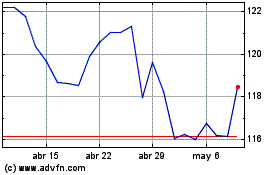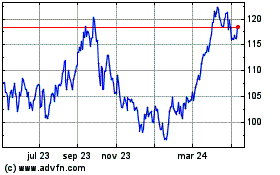Exxon Mobil Sues Cuban Companies Over Seized Property
03 Mayo 2019 - 7:58PM
Noticias Dow Jones
By Mengqi Sun
Exxon Mobil Corp. has sued two Cuban companies in a U.S. federal
court under a newly revived provision that permits legal action by
U.S. citizens or entities against companies doing business on
property that was confiscated by the Cuban government.
The lawsuit, filed Thursday in the U.S. District Court for the
District of Columbia, claims that two Cuban companies, Corporación
Cimex S.A. and Unión Cuba-Petróleo, use and profit from property,
including oil refineries and service stations, that an Exxon Mobil
predecessor company owned before it was seized in 1960 by the Fidel
Castro government.
Exxon Mobil is hoping to recover about $280 million in losses
associated with the property, a company spokesman said.
Cimex didn't immediately respond to a request for comment
Friday. A Unión Cuba-Petróleo representative said Friday she can't
comment without authorization.
Havana-based Cimex operates in industries including real estate,
financial services and logistics, according to its website.
Unión Cuba-Petróleo, or Cupet, is an oil company and operates
refineries in Cuba, according to its website. Exxon Mobil said
Cimex operates hundreds of service stations in cooperation with
Cupet, according to the complaint.
The Exxon Mobil case is one of the first lawsuits filed under
Title III of the 1996 Helms-Burton Act since its two-decade
suspension was lifted. Two U.S. citizens filed suit Thursday
against Carnival Corp., alleging the cruise operator is doing
business on seized property in Cuba that they had stakes in.
Title III allows certain U.S. nationals and companies with
claims to properties confiscated by the Cuban government to sue
companies, including some Cuban entities, that are operating on
that property for compensation. The law applies to properties
confiscated in or after 1959.
The provision had been suspended in response to complaints by
the European Union that the law overreached its jurisdiction and
restricted the EU's trade with Cuba.
The Trump administration first in March partially lifted the
suspension to allow private actions against Cuban entities or
subsidiaries that are identified on the State Department's
restricted entities list, before fully lifting the suspension on
Title III beginning Thursday.
Cimex is on the State Department's restricted list and is also
blacklisted by the U.S., which said in 2004 that it was owned by
the Cuban government and no U.S. companies or individuals are
permitted to work with the company.
Exxon Mobil essentially inherited the claim of ownership on the
Cuban property from Standard Oil Co., according to the complaint.
Standard Oil is a predecessor to Exxon Mobil.
The U.S. Justice Department's Foreign Claims Settlement
Commission certified that Standard Oil suffered a loss of more than
$71.6 million as a result of the confiscation, which is one of the
highest among the nearly 6,000 certified claims in the agency's
Cuban claims program.
Exxon Mobil is seeking damages that include the value of the
claim, plus interest, among other things, according to the
lawsuit.
Write to Mengqi Sun at mengqi.sun@wsj.com
(END) Dow Jones Newswires
May 03, 2019 20:43 ET (00:43 GMT)
Copyright (c) 2019 Dow Jones & Company, Inc.
Exxon Mobil (NYSE:XOM)
Gráfica de Acción Histórica
De Mar 2024 a Abr 2024

Exxon Mobil (NYSE:XOM)
Gráfica de Acción Histórica
De Abr 2023 a Abr 2024
